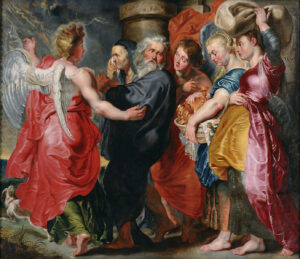Recently, the “Cathedral of Hope,” the self-proclaimed largest LGBTQ+-friendly church in the world, held a special “Pride service” to bless members of the drag community. It was an act of protest against Texas’s Senate Bill 12, which aims to restrict “sexually oriented performances on public property, on the premises of a commercial enterprise, or in the presence of a child.” Washington Post columnist Karen Attiah was there to report on the event – which included Dallas members of the Sisters of Perpetual Indulgence, a group of “queer and trans nuns” – and offer commentary on the groups of protesters standing outside.
“Cathedral of Hope members advised me to keep a distance from the protesters. I approached them anyway,” declared the fearless Attiah, who would certainly not be intimidated by “a dozen or so Catholic protesters holding rosaries.” She decided to pose a “theological question” to the leader of the Catholic protestors. “Drag queens have been around for decades,” she noted. “I grew up watching men dressing as women on TV and in the movies. Why the outrage now?”
I hope I’m not the only one who noticed Ms. Attiah’s theological question wasn’t, well, theological. Because the question of why Americans today are protesting and resisting public drag queen events is not theological at all, but political. (It’s also either ignorant or disingenuous – neither Dustin Hoffman’s “Tootsie” nor Robin Williams “Mrs. Doubtfire” donned the attire of women because it was a new gender identity they sought to impress upon prepubescent children.) But perhaps we cannot expect theological precision from a journalist whose blog refers to her own writings as “divine musings.”
Then again, curious developments are afoot as to how our increasingly areligious society understands God and church. For liberals, be they of a mainline Protestant or progressive Catholic persuasion, the social gospel movement and “Spirit of Vatican II” have born their fruits, largely collapsing religion into political liberalism to such a degree that these churches are largely indistinguishable from the political Left. They are, as Norman Podhoretz once said of Reform Judaism “the Democratic Party at prayer.”
Attiah herself asserts: “Places of worship are important centers of resistance. They are political, legal and spiritual testing grounds.” Note that order: the spiritual only serves as a patina for the church’s true (i.e., secular) mission.
“The personal is political,” was the rallying cry of second-wave feminism. That the theological is also political is the unspoken assumption of post-Christian America. This is perhaps particularly the case for the “nonverts,” academic Stephen Bullivant’s word to describe those who, though once aligned with some Christian tradition, have rejected it in favor of non-affiliation.

If Bullivant’s eponymous book is any indication, many such persons perceive their former faith in a peculiarly political light, and thus a threat to liberal values of freedom and self-expression.
That being the case, why not fight fire with fire? If your church preaches that homosexuality is a sin, we will find and celebrate those willing to participate in Pride marches. If your church declares transgenderism gravely misguided, we will run fluff pieces on ones that have special communion services for drag queens. If your church promotes the pro-life cause, we will leverage the law to harass and persecute you. Arm the progressive churches with all the rhetorical ammunition that can be mustered – that is the battle-plan employed by the unholy alliance of media, academia, the entertainment industry, and even our government bureaucracy.
Of course, from a Catholic perspective, the demarcation between Church and State has always been complicated. Though the Church has always asserted her difference and independence from the State, she has also declared her right to comment on and influence the State – and, indeed, for some centuries even to the present day, she has often been a State. Nevertheless, from her beginnings, the Magisterium has used theology to inform politics, not vice versa. Nicea and Chalcedon did not promulgate Christological and Trinitarian dogma because of imperial opinion – indeed, it was often meddling emperors trying to change Church teaching.
Much the same can be said regarding the Church’s teachings on sexuality, the focal point of so much contemporary distemper over Catholicism’s supposed overreach into the public square. Church opposition to abortion, homosexuality, and transgenderism derive not from popular opinion but from a Catholic anthropology informed by theological and anthropological premises, which, as far as they can be attributed to the natural law, are binding on all persons, regardless of religious affiliation.
This, of course, is why public (Catholic) intellectuals such as Ryan T. Anderson make their appeals to secular America via arguments and ideas we share in common. For Catholics, our politics is often informed by our theology, but not vice versa.
Yet such distinctions are lost on people like Attiah, who seem to interpret religion solely through a utilitarian lens of political expediency. In the same WaPo column, she asks another “theological” question. “What is a nun? Aren’t they more than just clothing and rosary beads? Members of the Sisters of Perpetual Indulgence say they believe in the rights and humanity of all people, including LGBTQ+ people – so why can’t they have nuns?”
This question, admittedly, falls closer to the theological realm, given it has to do with religious vocation. But it is also a question contextualized in a specifically secular manner: what makes a person a religious, according to Attiah, is not a vow consecrating oneself to God, but a peculiar belief about man and his place in the polis, namely, his equality before the law. According to this singularly secular definition, a nun has nothing to do with the divine, nor vows of poverty, chastity, and humility. It is just a political identity.
Yet in a world shorn of the transcendent, in which theology is vulgarized to solely secular projects, will man’s heart, perennially unfulfilled by the merely material, be satisfied? That seems like a theological question.















